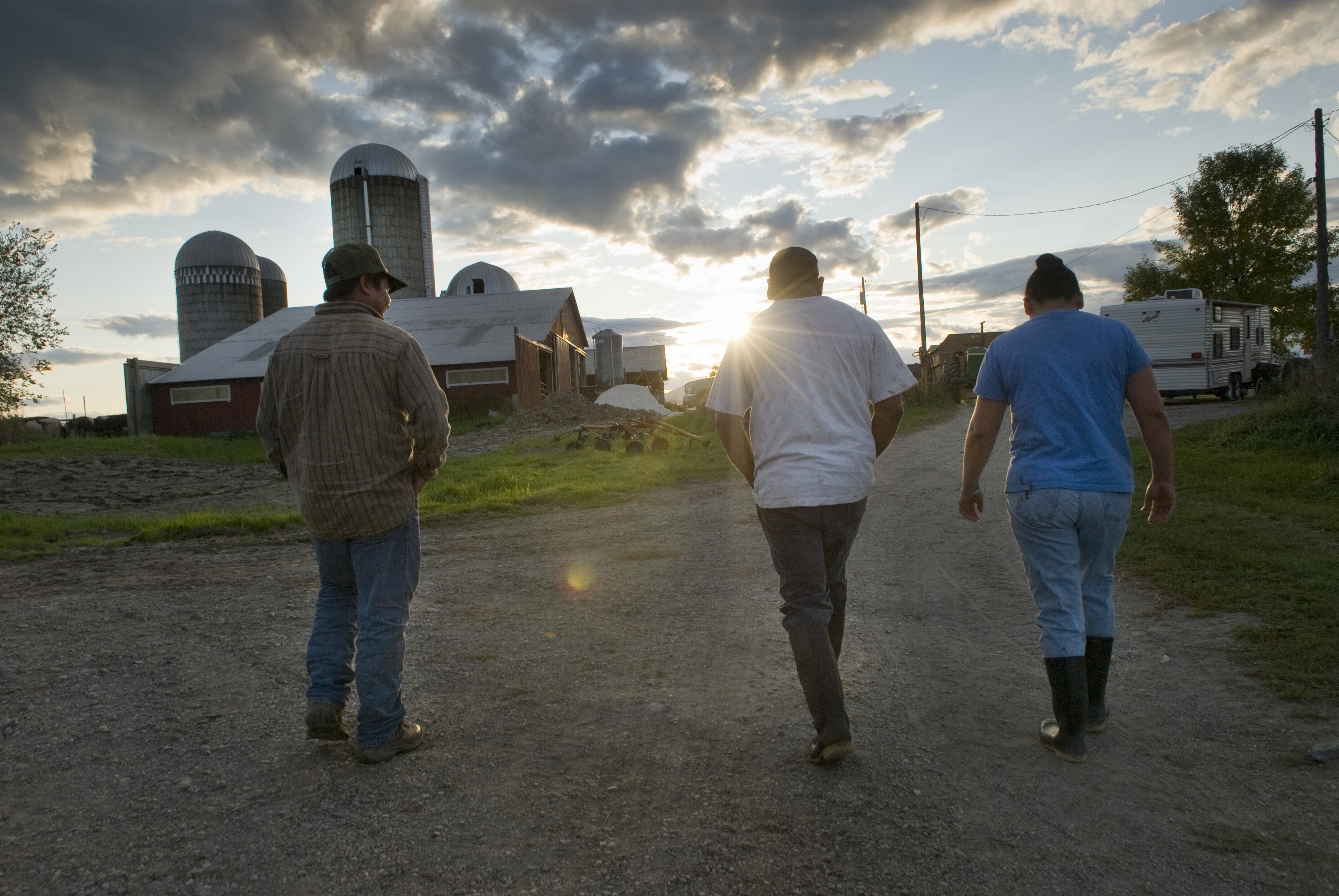Part II. Coast To Coast: Ready for Milk with Dignity!
Posted Fri, 02/24/2017 - 1:37pm
East Coast: VT Conference Participants Say...EmpowerMint of Farmworkers Sure Seems Logical
“At UVM, I’ve been working on sustainable agriculture programs for over 20 years. And so, to me, if we want a truly sustainable agriculture in Vermont, then we must address these very important social issues that exist on our farms and within our communities. I commend the work of Migrant Justice and their partners to help ensure that our farmworkers have access to a safe and supportive working environment and adequate living conditions.”-- Deb Heleba, NOFA board member.
Migrant Justice returned to a cold Vermont winter last week energized by a warm reception in Califiornia from Real Food Challenge (RFC) and five different Stanford University organizations who organized a Milk with Dignity (MD) Program update in advance of a Stanford visit the next day from Ben & Jerry’s CEO, Jostein Solheim. Students left the event so inspired by Vermont dairy worker's human rights struggle that, as RFC shared in a recent blog post, they took immediate action:
"The next day students showed up at Solheim’s talk seeking answers for his delayed promise to stand up for farmworker’s human rights in his supply chain by joining the Milk with Dignity Program as he committed to back in June 2015. Had students not organized to lift up the voices of Vermont’s dairy workers, Solheim would have come and gone from campus without mention of or being held accountable to REAL social justice, a core value of the B&J’s company . But RFC and Stanford students refused to let Solheim off the hook." (For a full report on the Stanford actions head over to the MJ blog.)
Upon arriving to Vermont, Migrant Justice hit the ground running at the huge annual Northeast Organic Farmer Association (NOFA) conference hosted at UVM where hundreds of farmers and food justice activists gathered for critical conversations about building a sustainable food system, "Beyond Borders". And, like at Stanford, the Milk with Dignity (MD) Program was recognized as a much needed 21st century worker-led solution to secure farmworker’s human rights in dairy supply chains. Migrant Justice’s Enrique "Kike" Balcazar laid out the story of farmworkers’ journey to envision, design and then build the Milk with Dignity Program to a room full of eager participants hungry for a model that would build a foundation of fairness in the food system (for the backstory on the MD Program check out this video here). The urgent need to center the conversation of worker's rights in the food system was certainly not lost on Deb Heleba, UVM Extension staffer and Northeast Organic Farming Association (NOFA) Vermont Board member. Deb, one of about 30 participants who attended last Saturday's workshop, reflected:
“At UVM, I’ve been working on sustainable agriculture programs for over 20 years. And so, to me, if we want a truly sustainable agriculture in Vermont, then we must address these very important social issues that exist on our farms and within our communities. I commend the work of Migrant Justice and their partners to help ensure that our farmworkers have access to a safe and supportive working environment and adequate living conditions."
Photo by Caleb Kenna
 Balcazar then turned the presentation over to Rafaela Rodriguez, sharing, "It is an honor for my community to be able to stand here today and introduce the first auditor from the newly created Milk with Dignity Standards Council (MDSC), which is the MD program’s third party monitor organization." Rodriguez shared that the MDSC is ready to roll out the MD Program and explained that the MDSC was designed in collaboration with, and modeled after, the third party auditor of the Fair Food Program in Florida, a program that Rutgers University labor expert Janice R. Fine called, “the best workplace-monitoring program I’ve seen in the U.S.”
Balcazar then turned the presentation over to Rafaela Rodriguez, sharing, "It is an honor for my community to be able to stand here today and introduce the first auditor from the newly created Milk with Dignity Standards Council (MDSC), which is the MD program’s third party monitor organization." Rodriguez shared that the MDSC is ready to roll out the MD Program and explained that the MDSC was designed in collaboration with, and modeled after, the third party auditor of the Fair Food Program in Florida, a program that Rutgers University labor expert Janice R. Fine called, “the best workplace-monitoring program I’ve seen in the U.S.”
Rodriguez further shared how the MDSC staff is building upon the demonstrated successes and best practices of the Fair Food Standards Council while also adapting to the specific context of Vermont and the dairy industry. Rodriguez shared her enthusiasm that the MDSC is really a new resource for both farmworkers and farmers and that she is excited and ready to “partner with farmers and farmworkers to support them to understand, participate in, and achieve compliance with the labor standards in the Milk with Dignity Code of Conduct.”
The workshop at NOFAVT concluded with a critical audience question directed to Enrique Balcazar: “Is there actually a dairy product that consumers can purchase knowing that human rights of dairy workers are respected?” To which Balcazar responded bluntly,
“No. There is no Milk with Dignity. There is no set of worker-defined standards that are truly enforced across an entire supply chain in this industry and there is no worker-led initiative to actually make it work. That is exactly what we are creating.”
